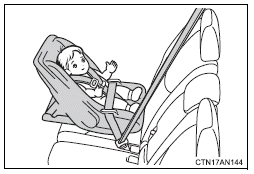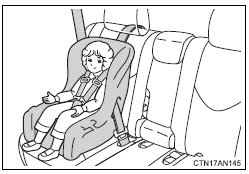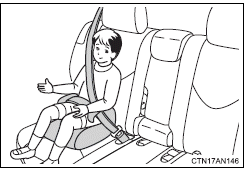 Toyota RAV4: Types of child restraint
Toyota RAV4: Types of child restraint
Child restraint systems are classified into the following 3 types according to the age and size of the child.
Rear facing - Infant seat/convertible seat

Forward facing - Convertible seat

Booster seat

■Selecting an appropriate child restraint system
●Use a child restraint system appropriate for the child until the child
becomes large enough to properly wear the vehicle’s seat belt.
●If a child is too large for a child restraint system, sit the child on a rear
seat and use the vehicle's seat belt.
CAUTION
■Child restraint precautions
●For effective protection in automobile accidents and sudden stops, a child
must be properly restrained, using a seat belt or child restraint system
depending on the age and size of the child. Holding a child in your arms is
not a substitute for a child restraint system. In an accident, the child can be
crushed against the windshield, or between you and the vehicle's interior.
●Toyota strongly urges the use of a proper child restraint system that conforms
to the size of the child, installed on the rear seat. According to accident
statistics, the child is safer when properly restrained in the rear seat
than in the front seat.
●Never install a rear-facing child restraint system on the front passenger
seat even if “AIR BAG OFF” indicator light is illuminated.
In the event of an accident, the force of the rapid inflation of the front
passenger
airbag can cause death or serious injury to the child if the rear-facing
child restraint system is installed on the front passenger seat.
●A forward-facing child restraint system may be installed on the front passenger
seat only when it is unavoidable. A child restraint system that
requires a top tether strap should not be used in the front passenger seat
since there is no top tether strap anchor for the front passenger seat.
Adjust the seatback as upright as possible and always move the seat as
far back as possible even if the “AIR BAG OFF” indicator light is illuminated,
because the front passenger airbag could inflate with considerable
speed and force. Otherwise, the child may be killed or seriously injured.
●Do not use the seat belt extender when installing a child restraint system
on the front or rear passenger seat. If installing a child restraint system
with the seat belt extender connected to the seat belt, the seat belt will not
securely hold the child restraint system, which could cause death or serious
injury to the child or other passengers in the event of a sudden stop,
sudden swerve or accident.
●Do not allow the child to lean his/her head or any part of his/her body
against the door or the area of the seat, front and rear pillars or roof side
rail from which the side airbags or curtain shield airbags deploy even if the
child is seated in the child restraint system. It is dangerous if the side
airbags
and curtain shield airbags inflate, and the impact could cause death
or serious injury to the child.
●Make sure you have complied with all installation instructions provided by
the child restraint manufacturer and that the system is properly secured. If
it is not secured properly, it may cause death or serious injury to the child
in the event of a sudden stop, sudden swerve or an accident.
■When children are in the vehicle
Do not allow children to play with the seat belt. If the seat belt becomes
twisted around a child’s neck, it may lead to choking or other serious injuries
that could result in death.
If this occurs and the buckle cannot be unfastened, scissors should be used
to cut the belt.
■When the child restraint system is not in use
●Keep the child restraint system properly secured on the seat even if it is
not in use.
Do not store the restraint unsecured in the passenger compartment.
●If it is necessary to detach the child restraint system, remove it from the
vehicle or store it securely in the luggage compartment. This will prevent it
from injuring passengers in the event of a sudden stop, sudden swerve or
accident.
 Points to remember
Points to remember
Studies have shown that installing a child restraint on a rear seat is
much safer than installing one to the front passenger seat.
● Choose a child restraint system that suits your vehicle a ...
 Installing child restraints
Installing child restraints
Follow the child restraint system manufacturer's instructions. Firmly
secure child restraints to the outside rear seats using the LATCH
anchors or a seat belt. Attach the top tether strap when insta ...
See also:
Programming the integrated garage door opener on the rear-view mirror
Programming
WARNING
Only press the transmitter button on the integrated remote control if there are
no persons or objects present within the sweep of the garage door. People could
otherwise ...
Overloading
CAUTION - Vehicle weight The gross axle weight rating (GAWR) and the gross vehicle
weight rating (GVWR) for your vehicle are on the manufacturer's label attached to
the driver's door. Exce ...
How Does an Airbag Restrain?
In moderate to severe frontal or near frontal collisions, even belted occupants
can contact the steering wheel or the instrument panel. In moderate to severe side
collisions, even belted occupants ...
